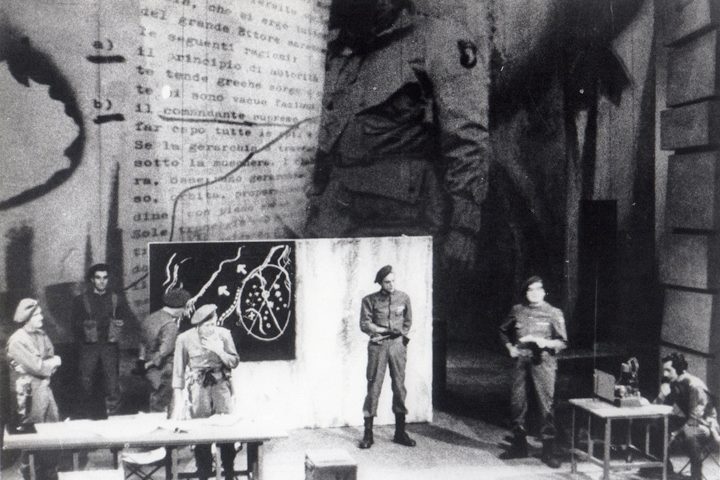Debut: Genoa, Sala Eleonora Duse, 19 November 1964 (RaiTeche movie)
| Version for the scene | Luigi Squarzina |
| Direction | Luigi Squarzina |
| Assistant to the artistic direction | Paolo Giuranna |
| Set and costume | Gianni Polidori |
| Music | Gino Negri |
| Production | Teatro Stabile di Genova |
Characters and performers
The Trojans
| Priam, king of Troy | Luigi Dameri |
| Ettore, his firstborn and commander in chief | Mario Erpichini |
| Helenus, son of Priam | Sandro Rossi |
| Paride, son of Priam | Gianfranco Ombuen |
| Troilus, son of Priam | Luigi Vannucchi |
| Aeneas, officier | Giancarlo Maestri |
| Calcante, scientist passed to the Greeks | Enrico Ardizzone |
| Pandaro, uncle of Cressida | Camillo Milli |
| Alexander, Pandaro's servant | Gianni Fenzi |
| Troilo's attendant | Arnaldo Bagnasco |
| An officer of the Parisian suite | Renato Romano |
| Margarelone, bastard son of Priam | Carlo Quartucci |
| Andromache, wife of Ettore | Margherita Guzzinati |
| Cassandra, daughter of Priamo | Marzia Ubaldi |
| Cressida, daughter of Calcante | Paola Mannoni |
The Greeks
| Agamemnon, commander in chief of the Greek alliance | Gigi Pistilli |
| Menelaus, his brother, general | Claudio Remondi |
| Achilles, general | Gastone Moschin |
| Ulysses, admiral | Claudio Gora |
| Ajax, general | Eros Pagni |
| Nestore, high marshal | Alfredo Marchetti |
| Diomede | Omero Antonutti |
| Patroclus | Giancarlo Zanetti |
| Thersite, journalist | Glauco Mauri |
| A Mirmidone officer | Giuliano Disperati |
| Elena, wife of Menelaus kidnapped by the Trojans rapita dai Troiani | Luisella Boni |
With this reinterpretation of Shakespeare, which aims to reference “the experiences we all have lived, the dangers we all run,” Squarzina once again makes Shakespeare our contemporary. Here, he reaches the peak of accuracy and consistency, proposing a theatre of civil and social commitment, and “inviting audiences to leave behind their passivity and to seek, in the play, not only and not truly an evening’s pleasure, but help for understanding and living”.
The director offers a dual modernisation of Shakespeare’s text. A modernisation of the language thanks to a translation that, while remaining essentially faithful to the text, modernises it with neologisms and slang forms from the spoken language. Then, there is visual modernisation related to the World War: Greek heroes wear khaki uniforms like American generals, while Trojan ones are dressed in grey/green, toting guns and assault rifles. Further, Elena wears a white fox cape, Paris a suit and rapier, Priam a nightgown, and Cressida a bikini; Achilles flirts with Patroclus in a trailer, Troilus is an aviation pilot, Thersites is a journalist/paparazzo with cameras draped around his neck, and Calchas is a scientist who has gone over to the enemy. Thus is Shakespeare’s savage satire about the Trojan fully understood: as a war for an operetta.
The Rai news service
We thank Teatro Nazionale di Genova for the concession of the use of photographic material.

